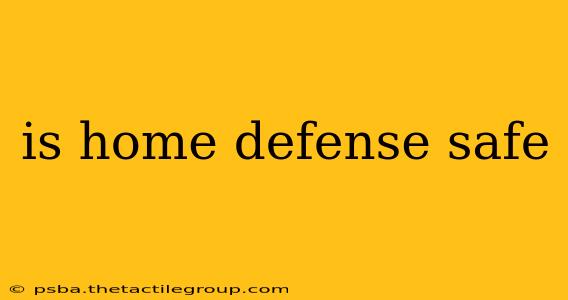Home defense is a complex issue, sparking passionate debate and raising serious concerns about safety. While the goal is to protect loved ones, the reality is that using force, even in self-defense, carries significant risks. This article explores the multifaceted nature of home defense, examining the safety implications, legal considerations, and responsible practices to minimize risks.
The Risks Associated with Home Defense
Before diving into the specifics of safe home defense, it's crucial to acknowledge the inherent risks:
1. Accidental Injury or Death:
This is perhaps the most significant risk. The use of firearms, even by trained individuals, can result in accidental shootings. Stressful situations, adrenaline surges, and poor judgment can lead to tragic consequences. Even non-lethal self-defense tools can cause unintended harm if misused.
2. Escalation of Violence:
Responding to a threat with force can escalate the situation. A seemingly minor incident might escalate into a violent confrontation, potentially leading to injuries for both the homeowner and the intruder. Furthermore, using excessive force can lead to serious legal repercussions.
3. Legal Ramifications:
The legal landscape surrounding self-defense varies significantly by location. Even if you act in self-defense, you must be able to prove your actions were justified and proportionate to the threat. Misinterpreting the law or acting without sufficient justification can lead to criminal charges. Understanding your local laws regarding self-defense is absolutely paramount.
4. Psychological Trauma:
The experience of defending your home, even if successful, can be deeply traumatic. Witnessing violence, using force, and even the anticipation of potential threats can have significant and long-lasting psychological effects on both the homeowner and their family.
Safe Home Defense Practices: Minimizing Risks
While risks are undeniable, responsible practices can significantly minimize them:
1. Comprehensive Training:
Proper training is non-negotiable for anyone considering using force for home defense. This includes comprehensive firearm safety courses (if using firearms), self-defense techniques (hand-to-hand combat or other non-lethal methods), and legal education on self-defense laws in your jurisdiction.
2. Secure Weapon Storage:
If you choose to use firearms, responsible storage is vital. Secure gun safes, trigger locks, and responsible ammunition storage are crucial to prevent accidental access, especially by children or unauthorized individuals.
3. Situational Awareness:
Maintaining situational awareness is critical. Be mindful of your surroundings, both inside and outside your home. Install security systems, use exterior lighting, and consider reinforcing entry points.
4. Non-Lethal Options:
Explore non-lethal self-defense options first. These include alarm systems, pepper spray, personal alarms, and other tools that deter intruders without resorting to potentially lethal force.
5. Call 911 Immediately:
After any incident involving home defense, immediately call emergency services. Report the incident, cooperate fully with law enforcement, and provide all relevant information accurately.
Conclusion: A Responsible Approach
Home defense is a serious responsibility, and safety should always be the primary concern. While protecting your family is paramount, acting recklessly or without proper training can lead to unintended consequences. By understanding the risks, investing in training, and practicing responsible self-defense strategies, you can significantly reduce the likelihood of negative outcomes and safeguard both yourself and your loved ones. Remember, proactive security measures and responsible preparation are key elements in ensuring home defense remains a means of protection, not a source of danger.

